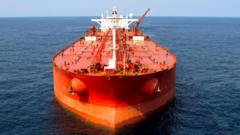Global oil markets experienced a dramatic surge following reports that Israel had launched strikes against Iran, leading to heightened tensions in the Middle East. The benchmark price for Brent crude surged over 10% as traders reacted, reaching its highest rate since January. The immediate concern centers around the possibility of a conflict that could disrupt oil supplies from the energy-abundant region.
In the aftermath of the initial spike, oil prices moderated slightly but remained over 5% higher than the previous closing price, trading around $74.47 per barrel. Despite these fluctuations, current prices are still notably over 10% lower than the levels observed at this time last year, and they fall significantly below the peaks experienced during early 2022, when prices soared above $100 per barrel following geopolitical tensions from Russia's invasion of Ukraine.
The ripple effect of increased oil prices caused stock markets across Asia and Europe to retreat, with Japan's Nikkei index declining by 0.9% and the UK's FTSE 100 index down 0.3% by midday. In the United States, the Dow Jones Industrial Average saw a drop of 1.5%, while the S&P 500 fell by 0.8%. In contrast, safe-haven investments like gold and the Swiss franc gained traction, with gold prices reaching their highest level in nearly two months as investors sought stability amid uncertainty, rising to $3,423.30 an ounce.
Reports indicate that the Israeli Defence Forces (IDF) reported an attack from Iran involving around 100 drones aimed at Israel. Analysts warn that the escalation of hostilities could significantly impact oil markets, with Vandana Hari of Vanda Insights noting that the current situation is volatile but may resolve quickly, as seen in similar past encounters. However, if tensions escalate further, Capital Economics projects Brent crude prices could skyrocket to between $80 and $100 per barrel, depending on whether Iranian oil production and export capabilities are compromised.
In the commercial sector, the UK motoring body the RAC's Rod Dennis mentioned that it is premature to predict how the current rise in oil prices will affect petrol costs. Key factors include the sustainability of these higher wholesale prices and retailer pricing strategies. In a worst-case scenario, Iranian actions could jeopardize the transportation of millions of barrels of oil daily, particularly if vital shipping infrastructure or routes like the Strait of Hormuz are targeted. This strait is crucial, handling approximately 20% of the world's oil supplies.
"Initial market reactions have indicated a risk-on attitude, but the true implications of the conflict will be clearer in the coming days," said Saul Kavonic, head of energy research at MST Financial, emphasizing that the energy market will need to adapt to the evolving crisis.





















